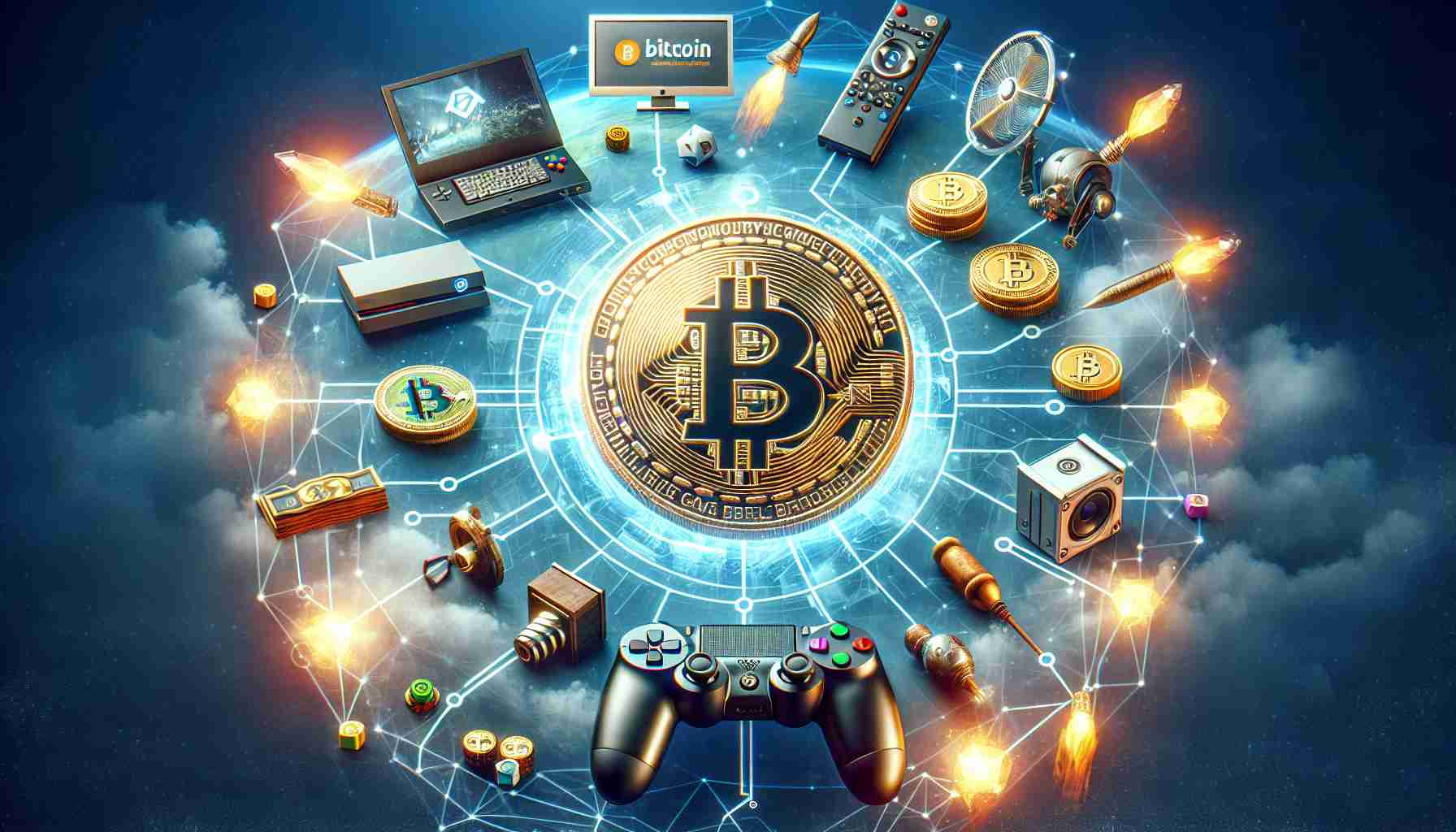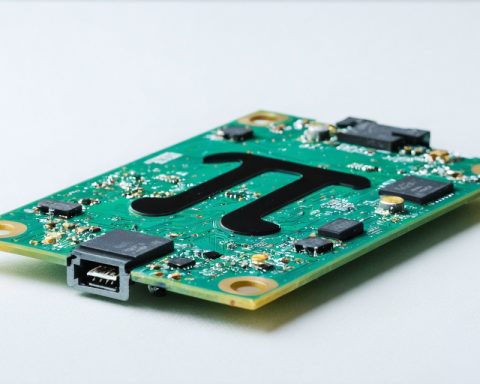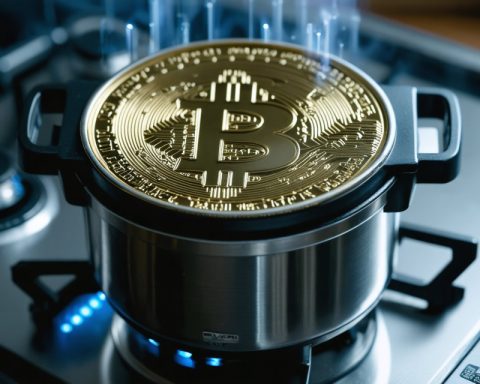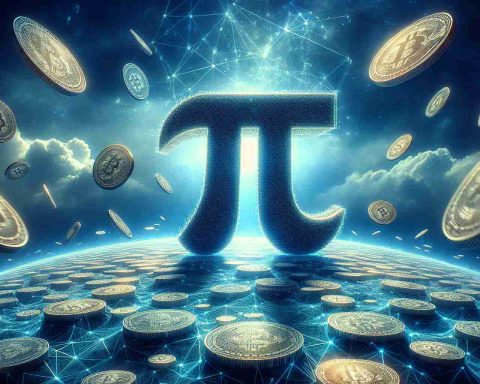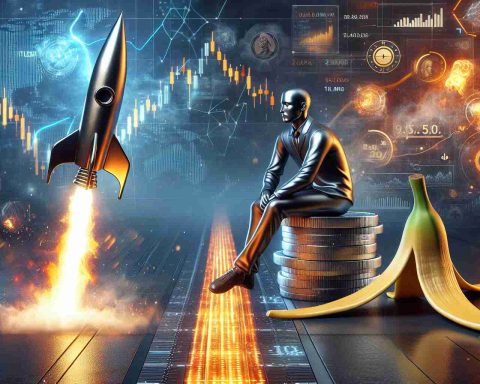- GameStop is exploring a move into digital currencies like Bitcoin, signaling a potential shift from its traditional retail model.
- This strategy emerges amid declining sales and challenges from digital game downloads.
- With a $4.6 billion cash reserve, GameStop considers cryptocurrencies as part of its evolution into digital finance.
- CEO Ryan Cohen’s discussions with Bitcoin enthusiast Michael Saylor have sparked interest, though Saylor isn’t involved in GameStop’s crypto plans yet.
- GameStop’s earlier NFT marketplace launch faced regulatory issues and was scaled back, but it hints at ongoing digital ambitions.
- The possibility of embracing digital assets has lifted GameStop’s stock, reflecting market optimism for transformation.
- The company’s exploration of Bitcoin suggests it might be key to navigating a new era beyond its retail origins.
The winds of change are sweeping through GameStop as whispers of a bold move into Bitcoin and other digital treasures emerge. This iconic video game retailer, with its rich but turbulent past, seems poised to dance with digital currencies amidst its own retail challenges.
Against a backdrop of dwindling sales and the shifting sands of digital game downloads, GameStop stands at a crossroads. While its $4.6 billion cash reserve is a cushion, it’s just one part of the puzzle. As the company cozies up to the idea of cryptocurrencies, it hints at an evolution from a traditional gaming behemoth to potentially a heavyweight in the digital finance arena.
Recently, CEO Ryan Cohen held talks with Michael Saylor, a well-known Bitcoin enthusiast. This meeting has sparked intrigue, although Saylor remains outside of GameStop’s internal crypto discussions for now. Despite this momentum, the ultimate decision remains uncertain. GameStop might just circle back, resisting the crypto siren call.
Amid these strategic deliberations, GameStop’s past engagement with digital assets offers a preview. The launch of its NFT marketplace was anything but smooth, bogged down by regulatory snags that prompted a 2024 scale-back. Yet, its foray into digital realms isn’t distant history but a stepping stone to a future steeped in digital promise.
As speculation stirs, GameStop’s shares have seen a buoyant lift. This surge underscores the market’s appetite for transformation and renewal.
The broader narrative suggests a company intent on reinvention, longing to transcend its retail roots. For GameStop, Bitcoin isn’t just a digital asset; it might become the lifeboat steering towards the shores of a new era. Keep a watchful eye as this saga unfolds—GameStop’s future, it seems, is being rewritten one coin at a time.
Will GameStop’s Digital Pivot Revitalize Its Future or Lead to More Hurdles?
How-To Steps & Life Hacks for Engaging with Cryptocurrencies
Navigating the world of cryptocurrencies can be daunting, but there are actionable steps for individuals interested in this digital realm.
1. Get Informed: Educate yourself about blockchain technology, Bitcoin, and other cryptocurrencies. Utilize online resources, forums, and courses to build a foundational understanding.
2. Choose a Reliable Wallet: Select a cryptocurrency wallet (hardware or software) that suits your needs for storing digital assets securely. Consider well-reviewed options like Trezor or Ledger.
3. Select a Trusted Exchange: Platforms like Coinbase, Binance, or Kraken are popular for buying and trading cryptocurrencies. Ensure they have strong security features and a good reputation.
4. Stay Updated: Follow cryptocurrency news and trends, and be aware of regulatory developments in your region that might affect your investments.
5. Start Small: If you’re a beginner, consider buying a small amount of cryptocurrency to get accustomed to the process before making significant investments.
Real-World Use Cases for GameStop’s Cryptocurrency Integration
GameStop’s move to integrate digital currencies and NFTs (non-fungible tokens) could impact the gaming and retail industries in several ways:
– In-Game Purchases: Cryptocurrencies could be used for microtransactions and purchasing in-game assets, offering gamers a new way to interact with their favorite titles.
– Community Incentives: GameStop could potentially reward its community with cryptocurrency tokens for participation in store events or online interactions.
– Digitized Merchandise: NFTs can serve as digital memorabilia, offering unique and exclusive items for fans to collect and trade.
Market Forecasts & Industry Trends
The potential integration of cryptocurrencies by a large retailer like GameStop could signal broader adoption trends in retail. According to a report by Allied Market Research, the global cryptocurrency market is expected to reach $4.94 billion by 2030, expanding at a CAGR of 12.8% from 2021 to 2030.
Reviews & Comparisons with Other Retailers
While other companies like Tesla have dabbled in cryptocurrency, GameStop’s strategy could more closely mirror Overstock.com, which started accepting Bitcoin in 2014. Industry experts are divided on whether this digital shift will be sustainable long-term, given cryptocurrency volatility.
Controversies & Limitations
– Regulatory Challenges: GameStop encountered hurdles with its NFT marketplace, reflecting broader regulatory challenges in the crypto space. Companies must navigate complex legal landscapes, which can affect timelines and profitability.
– Speculative Risk: Cryptocurrencies are known for their volatility, posing financial risks to companies heavily invested in digital assets.
Features, Specs & Pricing Overview
If GameStop were to implement a digital wallet or crypto trading platform, it would need to focus on:
– User-Friendly Interface: Ensuring ease of use for average consumers unfamiliar with cryptocurrencies.
– Low Transaction Fees: Offering competitive fees to attract users.
– Security Features: Robust security for protecting user funds and personal information.
Security & Sustainability
Cryptocurrencies have come under scrutiny for their environmental impact due to energy-intensive mining processes. However, shifts towards proof-of-stake models and green energy solutions are being openly explored to mitigate these concerns.
Insights & Predictions
Analysts predict that GameStop’s potential shift into digital assets could lead to significant changes in how gaming communities interact with the retail space. Furthermore, if successful, it could inspire other retailers to explore similar digital transformations.
Pros & Cons Overview
Pros:
– New revenue streams through digital goods and in-game asset sales.
– Innovating the retail experience and possibly attracting a younger, tech-savvy customer base.
Cons:
– Regulatory and technical challenges with cryptocurrency and NFT markets.
– Financial risks associated with volatile digital asset markets.
Actionable Recommendations
– Stay Informed: For investors and enthusiasts, staying updated on GameStop’s plans and crypto market trends is crucial.
– Diversify Investments: Don’t put all eggs in one basket; consider a diversified investment portfolio.
– Secure Your Assets: If using cryptocurrency, prioritize security by choosing reputable wallets and exchanges.
For more information on cryptocurrency and digital marketplaces, visit reliable platforms like CoinDesk or Cointelegraph.
